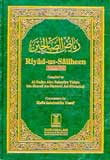Riyad Us-Saliheen (Gardens of the Righteous)

Chapter 225
The Excellence of Observing Saum (Fasting) in the months of Muharram and Sha'ban and the Secred Months
1246. Abu Hurairah (May Allah be pleased with him) reported: The Messenger of Allah (PBUH) said, "The best month for observing Saum (fasting) next after Ramadan is the month of Allah, the Muharram; and the best Salat (prayer) next after the prescribed Salat is Salat at night (Tahajjud prayers).''
[Muslim].
Commentary: Reference of the month to Allah is a sign of its distinction and auspiciousness like Baitullah, Naqatullah etc. Muharram is one of the sacred months and it is this month with which the Islamic year starts. The other three sacred months are Rajab, Dhul-Qa`dah, and Dhul-Hijjah. The Hadith points out that fasting in the month of Muharram is better than any other month of the year after Ramadan.
1247. `Aishah (May Allah be pleased with her) reported: The Prophet (PBUH) did not observe voluntary Saum (fasting) so frequently during any other month as he did during Sha`ban. He observed Saum throughout the month of Sha`ban.
Another narration is: He (PBUH) observed Saum during the whole month of Sha`ban except a few days.
[Al-Bukhari and Muslim].
Commentary: We learn from another Hadith the reason why the Prophet (PBUH) kept greater number of Saum in the month of Sha`ban. He did so because deeds are presented before Allah during this month. For this reason, he liked that when his deeds were presented, he should be observing Saum (Nasa'i on the authority of Usamah (May Allah be pleased with him). In spite of this distinction of Sha`ban, Muslims have been ordered to observe Saum in the first fortnight only, and not in the second in order to maintain their energy and vitality for the obligatory Saum (i.e., Ramadan). The Prophet (PBUH) had greater spiritual strength and Saum did not cause him weakness due to this strength. Again, by virtue of this strength he would sometimes even observe Saum which is termed "Saum-al-Wisal'' (observing Saum continuous without a break in the evening). But he has forbidden his followers from such Saum.
1248. Reported Mujibah Al-Bahiliyah on the authority of her father or uncle that he visited the Messenger of Allah (PBUH) once and then went to see him again after a year. His appearance had totally changed. He asked the Messenger of Allah (PBUH) if he had recognized him. The Messenger of Allah (PBUH) asked, "Who are you?'' He replied: "I am Al-Bahili who visited you last year.'' The Messenger of Allah (PBUH) said, "You were quite handsome, what has changed your appearance so much?'' He replied, "Since my departure from here, I have not eaten anything except at night.'' The Messenger of Allah (PBUH) remarked, "You have put yourself to torture. Observe Saum (fasting) during the Month of Patience (i.e., Ramadan) and fast one day from each month.'' He submitted, "Permit me to observe more voluntary fasts because I have capacity to do so.'' The Messenger of Allah (PBUH) said, "Then observe fasts for two days in every month.'' He said, "Permit me to observe more.'' The Messenger of Allah (PBUH) said, "Observe fasts on three days in every month.'' He requested that he should be allowed to observe more fasts. The Messenger of Allah (PBUH) said, "Fast three days during the sacred months and omit fasting for three days alternately.'' He (PBUH) joined his three fingers together and left them apart while repeating this sentence thrice.
[Abu Dawud].
Commentary: The name of Mujibah Bahiliyah's father was Abdullah bin Harith Al-Bahli, and if this incident relates to his uncle, his name is not well-known. In any case, he used to take meal at night only, that is, he used to observe Saum daily. Because of this routine, his health was greatly affected and the Prophet (PBUH) prohibited him from observing Saum daily and stressed that he should keep Saum thrice a month only, especially in the sacred months. With the formula of ten-fold reward, he could thus get reward of thirty days Saum in a month. This is how he would be reckoned as one who observes Saum throughout the year. People with weak health should not observe more than three Saum in a month. Those who are healthy, are allowed to observe more Saum, but it will be well if they do so in the style of Prophet Dawud, that is, on alternate days.
